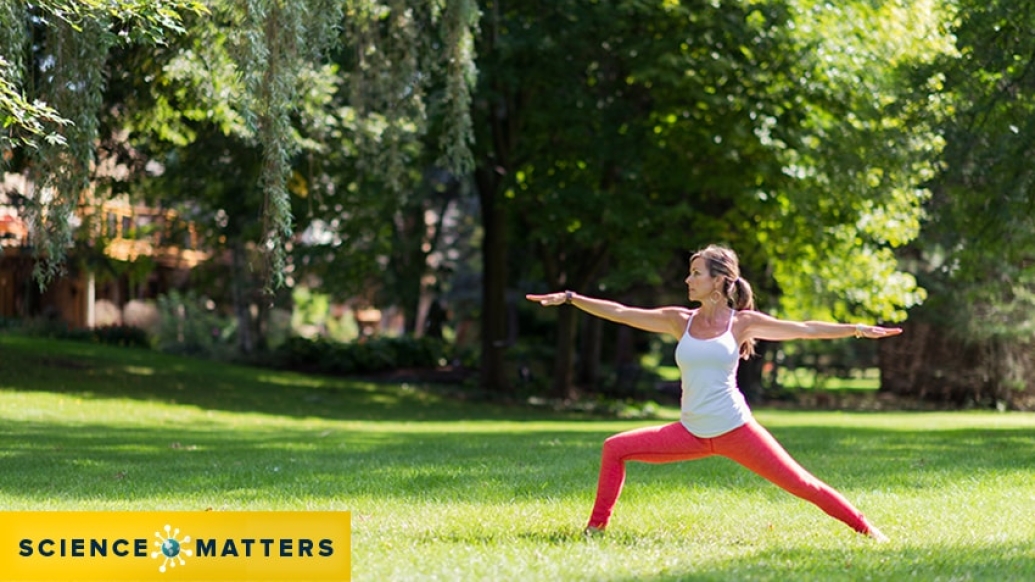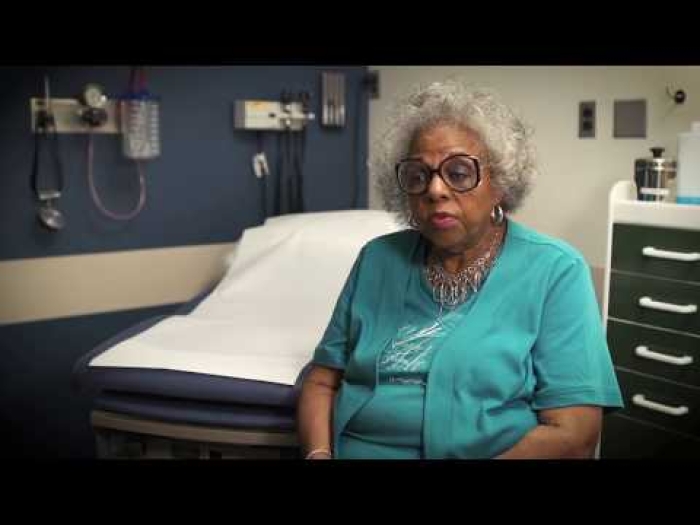Participation in clinical trials is one way a mother fights back against cancer. She also volunteers with cancer patients and is working to boost research funds to study her own disease.
7:00 AM
Author |

Flora Migyanka received more than 500 stitches when she had a double mastectomy in 2012. The mother of two young children had been diagnosed with stage 1 invasive lobular cancer in her right breast.
MORE FROM MICHIGAN: Sign up for our weekly newsletter
Migyanka worked through the stress by diving deep into the practice of yoga to ease her mind, body and spirit — an act so critical to her healing process that Migyanka became a certified yoga instructor and volunteers each week through the Cancer Support Community of Greater Ann Arbor.
She also began a 10-year cycle of the drug tamoxifen upon the recommendation of her oncologist, Daniel F. Hayes, M.D., co-director of the Breast Oncology Program at the University of Michigan Comprehensive Cancer Center.
"Tamoxifen is one type of anti-estrogen therapy that we recommend to decrease the chances that a type of breast cancer that needs estrogen will return," says Hayes. "These therapies have been shown to increase the chances of survival in such women. However, they must be taken daily for very long periods of time — at least five years, and maybe even 10 or more, depending on the patient's circumstances."
Helping others through research
Another way Migyanka empowers herself is by participating in cancer research and staying informed of the latest treatment advances. She is enrolled in two clinical trials funded through the National Institutes of Health.
SEE ALSO: 'Living Proof' That Federal Cancer Research, Funding Matters
One study collects data from women who have had breast reconstruction surgery and aims to create a computerized tool to help patients make informed reconstruction surgery decisions.
The other study focuses on using a mind-body intervention, specifically hypnotic muscle relaxation like yoga, to improve the body image of women who have received a diagnosis of breast or gynecologic cancer. Researchers will measure stress related to changes in the body.
Meanwhile, she continues to emphasize the importance of advocacy.
"Patients should become experts on their disease and feel empowered to ask many questions to their cancer team," Migyanka says. "You need to be CEO of yourself, build your team of experts, research the best care and clinical trials and generate a strategic plan that best suits you. I feel the more engaged you are, the more control you have — mentally and physically — over your care."
Migyanka, who has worked in the biotech industry for over 15 years, knows firsthand the value of such trials. She sees instances of new therapies being developed for many diseases, with some patients exhausting all options before entering a clinical trial that could save their lives.
"Some are very fortunate and others are not, but without doing these trials or research, the scientists will not make any progress," Migyanka says.
Encouraging donor support
Those trials, of course, can't occur without financial support.
With the proposed NIH budget cut of 20 percent by President Donald Trump and federal funding in question, potentially lifesaving research could be suspended.
Hayes, also president of the American Society of Clinical Oncology, argues that increased congressional funding for cancer research is crucial to increasing the number of cancer survivors in the United States.
"We can do better, but not if it's not funded," Hayes said last month at a press briefing on Capitol Hill. "Every one of us will either have cancer or have a loved one or family member with cancer, and if you want us to keep treating people the way we are in 2017, give us a 20 percent NIH cut. But if you want us to keep making advances, we have to have the funding to make the advances."
Migyanka, too, has taken an active role in fundraising for cancer research.
She is planning the second annual Uncork for a Cure event in September to raise money for the U-M Breast Oncology Program and its pursuit of discovering and developing revolutionary personalized cancer therapies. The fundraiser brings together individuals touched by breast cancer to enjoy cuisine and wines from area chefs.
In the five years since her diagnosis, Migyanka views her cancer, invasive lobular carcinoma, as an understudied disease despite its accounting for 10 to 15 percent of all breast cancers.
"There is so much we don't know about ILC and we have to start somewhere. That somewhere is with patients and the community," says Migyanka, who hopes to raise enough funds through Uncork for a Cure for a study specific to ILC.
See Hayes' Capitol Hill remarks about NIH funding.
Watch a video about the Migyanka family and dealing with a cancer diagnosis.

Explore a variety of healthcare news & stories by visiting the Health Lab home page for more articles.

Department of Communication at Michigan Medicine
Want top health & research news weekly? Sign up for Health Lab’s newsletters today!





